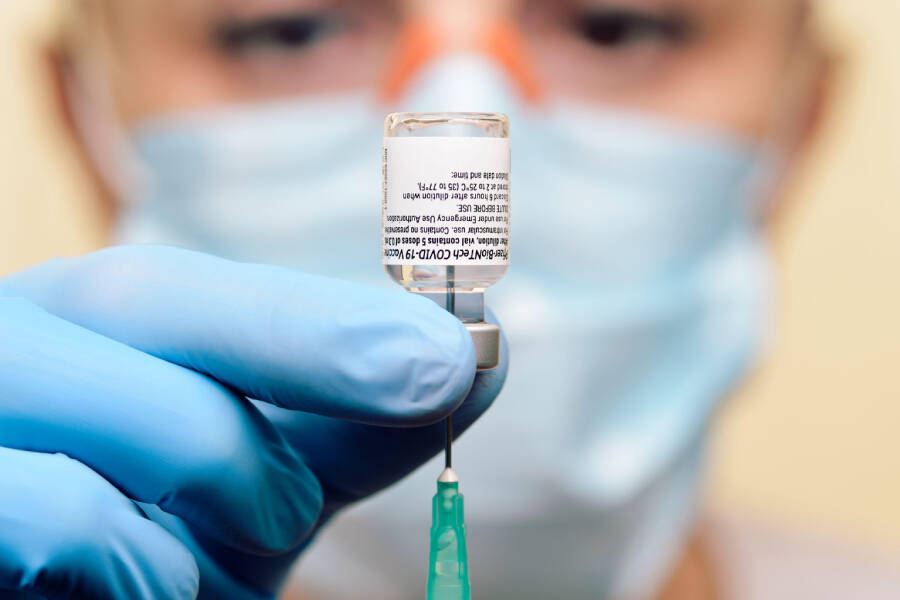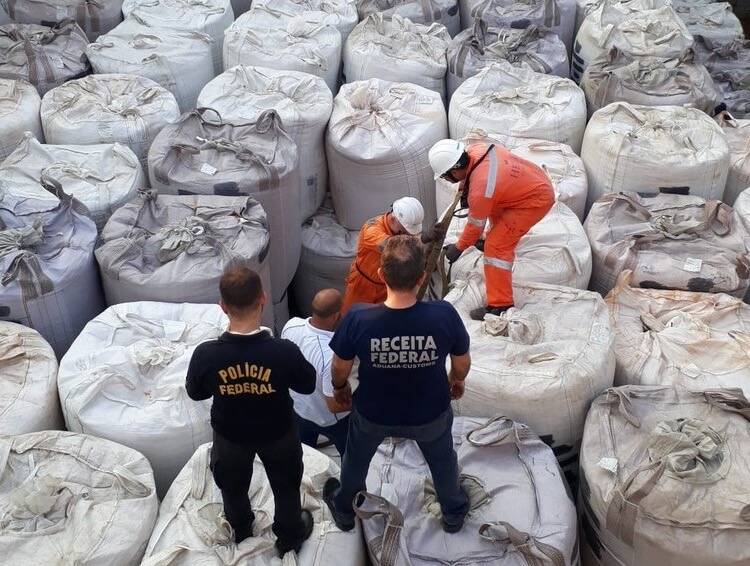The vaccine, called Calixcoca, has shown promising results in the first stages of clinical trials, though researchers are quick to say it is far from a "panacea."

AlamyA vaccine being prepared by a doctor in the United Kingdom.
In Brazil, cocaine and crack addiction poses a considerable problem for its government, medical facilities, and citizens.
Brazil is the second-largest consumer of cocaine in the world — second only to the United States. The country accounts for one-fifth of global cocaine demand. And now, scientists believe they can do something about it.
Researchers at the Federal University of Minas Gerais in southeastern Brazil have developed a vaccine they hope to use to treat cocaine addiction. The vaccine, Calixcoca, has shown promising results in animal trials and is set to move on to the final stage of trials, testing on humans.
Calixcoca works by triggering an immune response that blocks cocaine molecules from reaching the brain, essentially meaning that the drug would no longer cause a high, according to AFP. The immune system produces antibodies that bind the cocaine molecules in the bloodstream, making them too large to reach the brain’s “reward center,” which produces high levels of dopamine in response to the drug.
“Anything that can help is a blessing because, believe me, it takes superhuman powers to come off this drug… it controls your body, heart and soul,” said Adriano Martins, a former cocaine addict who now works as a counselor at a rehab center, in an interview with the Wall Street Journal. Martins said it took him 24 years to kick his addiction.
Psychiatrist Frederico Garcia led the team of scientists that developed the vaccine. The project won the top prize at the Euro Health Innovation Awards for Latin American medicine, and both scientists and the European government are desperate for a solution to the epidemic of cocaine addiction.
“There’s no specific registered treatment for cocaine and crack addiction. We currently use a combination of psychological counseling, social assistance, and rehabilitation, when necessary,” Garcia said.
There are currently 3 million regular users of cocaine and crack in Brazil, and an estimated 1 in 25 Brazilian adults have taken cocaine, according to estimates by the Federal University of São Paulo. Additionally, one in four adults who use cocaine become addicted, and only one in four of those who become addicted are able to recover.

Brazilian Federal PoliceBrazil is the second-largest consumer of cocaine in the world, accounting for one-fifth of global demand.
There have been attempts to find a vaccine for cocaine addiction before.
Thomas Kosten of Baylor College of Medicine in Houston, Texas, developed a similar vaccine in the early 2000s. Clinical trials fell short of FDA standards, however, despite promising results.
“About 60% of the people made sufficiently high enough levels of antibodies to block at least two to three doses of cocaine, so for someone who was motivated enough to stop, you could help them stop — but the other 40% didn’t make enough for it to work,” Kosten said. “The FDA felt you had to do a study in which everyone got enough antibodies, in which everybody did better than the placebo group.”
But the only current course of treatment for cocaine addiction is abstinence supplemented with therapy and medication — which Garcia said is only effective in 20% of patients over five years.
“So anything that is more than 20% effective is already a lot,” Garcia said.
Another advantage of the Brazilian vaccine over the failed U.S. equivalents is that Calixcoca uses synthetic proteins and chemical compounds produced in a lab rather than biological ingredients. The artificial components make it cheaper to produce and easier to store since the vaccine does not need to be stored at low temperatures.
Additionally, Calixcoca showed promising results when it came to protecting fetuses from cocaine. The vaccine was tested on pregnant rats, suggesting that it could be effective in protecting babies of pregnant users.
While the vaccine shows promising results, Garcia emphasized that it won’t be a “panacea” that can be administered to everyone.
The scientists developing Calixcoca hope to target people grappling with addiction “who are off (cocaine) and want to stay that way,” he said. Ideally, it would be used in patients at critical stages of their recovery, such as when they leave rehab.
Despite that, there is a tremendous public demand for the vaccine. Over 3,000 people have volunteered for the human testing phase of the clinical trial.
“I’ve been a slave to cocaine,” said José Teodoro, who is on the waiting list for the trial, in an interview with the Wall Street Journal. He said he has struggled with cocaine addiction for 30 years, with massive consequences in his personal and professional life.
“I’m not saying the vaccine will be our salvation,” he said, “but what have we got to lose?”
After reading about the vaccine being developed for cocaine addiction, check out these photos of the crack cocaine epidemic that devastated American communities in the 1980s. Or, read about a similar vaccine being developed to treat fentanyl addiction in the United States.





